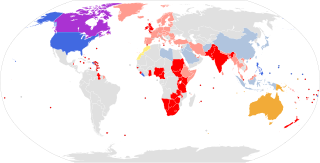Related Research Articles

A dictionary is a listing of lexemes from the lexicon of one or more specific languages, often arranged alphabetically, which may include information on definitions, usage, etymologies, pronunciations, translation, etc. It is a lexicographical reference that shows inter-relationships among the data.
In linguistics, a grammar is the set of rules for how a natural language is structured, as demonstrated by its speakers or writers. Grammar rules may concern the use of clauses, phrases, and words. The term may also refer to the study of such rules, a subject that includes phonology, morphology, and syntax, together with phonetics, semantics, and pragmatics. There are, broadly speaking, two different ways to study grammar: traditional grammar and theoretical grammar.
A thesaurus, sometimes called a synonym dictionary or dictionary of synonyms, is a reference work which arranges words by their meanings, sometimes as a hierarchy of broader and narrower terms, sometimes simply as lists of synonyms and antonyms. They are often used by writers to help find the best word to express an idea:
...to find the word, or words, by which [an] idea may be most fitly and aptly expressed
In grammar, a noun is a word that represents a concrete or abstract thing, such as living creatures, places, actions, qualities, states of existence, and ideas. A noun may serve as an object or subject within a phrase, clause, or sentence.

A synonym is a word, morpheme, or phrase that means exactly or nearly the same as another word, morpheme, or phrase in a given language. For example, in the English language, the words begin, start, commence, and initiate are all synonyms of one another: they are synonymous. The standard test for synonymy is substitution: one form can be replaced by another in a sentence without changing its meaning. Words may often be synonymous in only one particular sense: for example, long and extended in the context long time or extended time are synonymous, but long cannot be used in the phrase extended family. Synonyms with exactly the same meaning share a seme or denotational sememe, whereas those with inexactly similar meanings share a broader denotational or connotational sememe and thus overlap within a semantic field. The former are sometimes called cognitive synonyms and the latter, near-synonyms, plesionyms or poecilonyms.
In the study of language and literary style, a vulgarism is an expression or usage considered non-standard or characteristic of uneducated speech or writing. In colloquial or lexical English, "vulgarism" or "vulgarity" may be synonymous with profanity or obscenity, but a linguistic or literary vulgarism encompasses a broader category of perceived fault not confined to scatological or sexual offensiveness. These faults may include errors of pronunciation, misspellings, word malformations, and malapropisms. "Vulgarity" is generally used in the more restricted sense. In regular and mostly informal conversations, the presence of vulgarity, if any, are mostly for intensifying, exclaiming or scolding. In modern times, vulgarism continues to be frequently used by people. A research paper produced by Oxford University in 2005 shows that the age group of 10–20 years old speak more vulgarity than the rest of the world's population combined. The frequent and prevalent usage of vulgarity as a whole has led to a paradox, in which people use vulgarity so often that it becomes less and less offensive to people, according to The New York Times.
Literal and figurative language is a distinction that exists in all natural languages; it is studied within certain areas of language analysis, in particular stylistics, rhetoric, and semantics.
A solecism is a phrase that transgresses the rules of grammar. The term is often used in the context of linguistic prescription; it also occurs descriptively in the context of a lack of idiomaticness.

In the English language, there are grammatical constructions that many native speakers use unquestioningly yet certain writers call incorrect. Differences of usage or opinion may stem from differences between formal and informal speech and other matters of register, differences among dialects, and so forth. Disputes may arise when style guides disagree with each other, or when a guideline or judgement is confronted by large amounts of conflicting evidence or has its rationale challenged.
Vernacular is the ordinary, informal, spoken form of language, particularly when perceived as being of lower social status in contrast to standard language, which is more codified, institutional, literary, or formal. More narrowly, a particular variety of a language that meets the lower-status perception, and sometimes even carries social stigma, is also called a vernacular, vernacular dialect, nonstandard dialect, etc. and is typically its speakers' native variety. Despite any such stigma, modern linguistics regards all nonstandard dialects as full-fledged varieties of a language with their own consistent grammatical structure, sound system, body of vocabulary, etc.

A plurale tantum is a noun that appears only in the plural form and does not have a singular variant for referring to a single object. In a less strict usage of the term, it can also refer to nouns whose singular form is rarely used.
Etymology is the scientific study of the origin and evolution of a word's semantic meaning across time, including its constituent morphemes and phonemes. It is a subfield of historical linguistics, philology, and semiotics, and draws upon comparative semantics, morphology, pragmatics, and phonetics in order to construct a comprehensive and chronological catalogue of all meanings that a morpheme, phoneme, word, or sign has carried across time.
Folk etymology – also known as (generative) popular etymology, analogical reformation, (morphological)reanalysis and etymological reinterpretation – is a change in a word or phrase resulting from the replacement of an unfamiliar form by a more familiar one through popular usage. The form or the meaning of an archaic, foreign, or otherwise unfamiliar word is reinterpreted as resembling more familiar words or morphemes.
Neoclassical compounds are compound words composed from combining forms derived from classical languages roots. Neo-Latin comprises many such words and is a substantial component of the technical and scientific lexicon of English and other languages, via international scientific vocabulary (ISV). For example, Greek bio- combines with -graphy to form biography.

Despite the various English dialects spoken from country to country and within different regions of the same country, there are only slight regional variations in English orthography, the two most notable variations being British and American spelling. Many of the differences between American and British/English in the Commonwealth of Nations date back to a time before spelling standards were developed. For instance, some spellings seen as "American" today were once commonly used in Britain, and some spellings seen as "British" were once commonly used in the United States.
In morphology and lexicography, a lemma is the canonical form, dictionary form, or citation form of a set of word forms. In English, for example, break, breaks, broke, broken and breaking are forms of the same lexeme, with break as the lemma by which they are indexed. Lexeme, in this context, refers to the set of all the inflected or alternating forms in the paradigm of a single word, and lemma refers to the particular form that is chosen by convention to represent the lexeme. Lemmas have special significance in highly inflected languages such as Arabic, Turkish, and Russian. The process of determining the lemma for a given lexeme is called lemmatisation. The lemma can be viewed as the chief of the principal parts, although lemmatisation is at least partly arbitrary.
In French spelling, aspirated "h" is an initial silent letter that represents a hiatus at a word boundary, between the word's first vowel and the preceding word's last vowel. At the same time, the aspirated h stops the normal processes of contraction and liaison from occurring.

This list comprises widespread modern beliefs about English language usage that are documented by a reliable source to be misconceptions.
In literary criticism and rhetoric, a tautology is a statement that repeats an idea, using near-synonymous morphemes, words or phrases, effectively "saying the same thing twice". Tautology and pleonasm are not consistently differentiated in literature. Like pleonasm, tautology is often considered a fault of style when unintentional. Intentional repetition may emphasize a thought or help the listener or reader understand a point. Sometimes logical tautologies like "Boys will be boys" are conflated with language tautologies, but a language tautology is not inherently true, while a logical tautology always is.
In etymology, back-formation is the process or result of creating a new word via inflection, typically by removing or substituting actual or supposed affixes from a lexical item, in a way that expands the number of lexemes associated with the corresponding root word. The resulting is called a back-formation, a term coined by James Murray in 1889.
References
- ↑ "Livy's Patavinitas," Kurt Latte, Classical Philology, Vol. 35, No. 1 (Jan., 1940), pp. 56–60
- 1 2 James Murray, ed. (1885). "barbarism, n.". Oxford English Dictionary. London: Clarendon Press.
- 1 2 3 McArthur, Roshan (2005). R. McArthur & T. McArthur (ed.). Concise Oxford Companion to the English Language . Oxford University Press. ISBN 978-0-19-280637-6.
- ↑ See Barbarism (etymology) The American Heritage Dictionary of the English Language: Fourth Edition. 2000.
- ↑ Alessandro Garcea and Valeria Lomanto, "Gellius and Fronto on Loanwords and Literary Models: Their Evaluation of Laberius", in Leofranc Holford-Strevens and Amiel Vardi (eds.), The Worlds of Aulus Gellius (Oxford University Press, 2004), p. 49 n21, citing Raija Vainio, Latinitas and Barbarism According to Roman Grammarians: Attitudes Towards Language in the Light of Grammatical Examples (University of Turku, 1999), p. 91.
- ↑ Stanley, Thomas (1656). The History of Philosophy. H. Moseley and T. Dring. p. 33.
- ↑ John Stoddart; William Hazlitt (1858). Encyclopædia Metropolitana; or, System of Universal Knowledge.
- ↑ Lev Uspensky, A Word about Words , Ch. 8 (in Russian)
- ↑ Карский Е. Ф., О так называемых барбаризмах в русском языке (краткий отчёт Виленской 2 гимназии), Вильна, 1886: